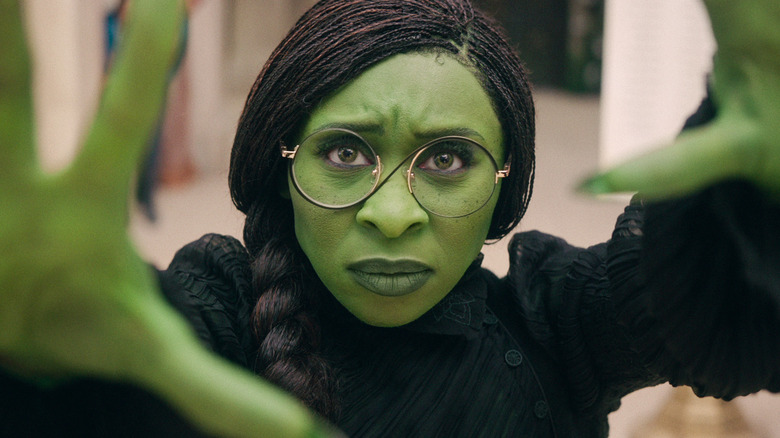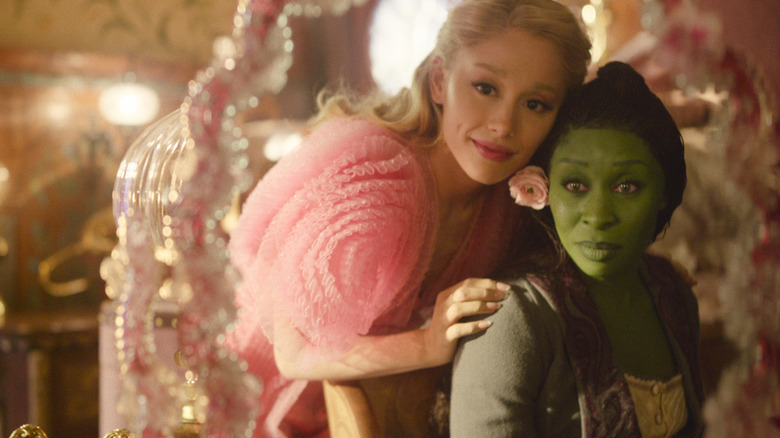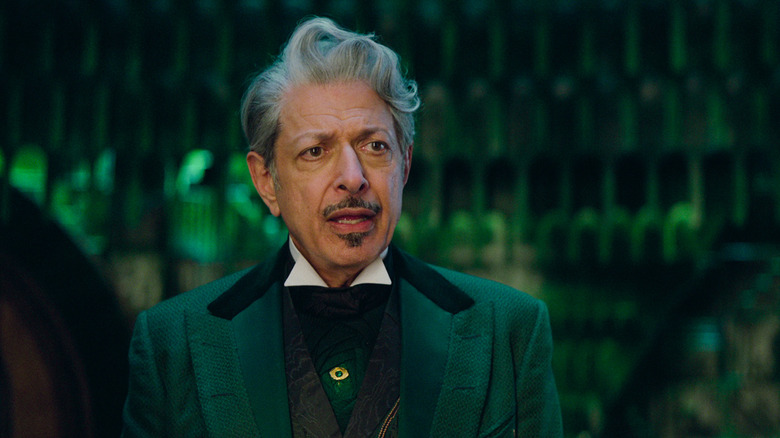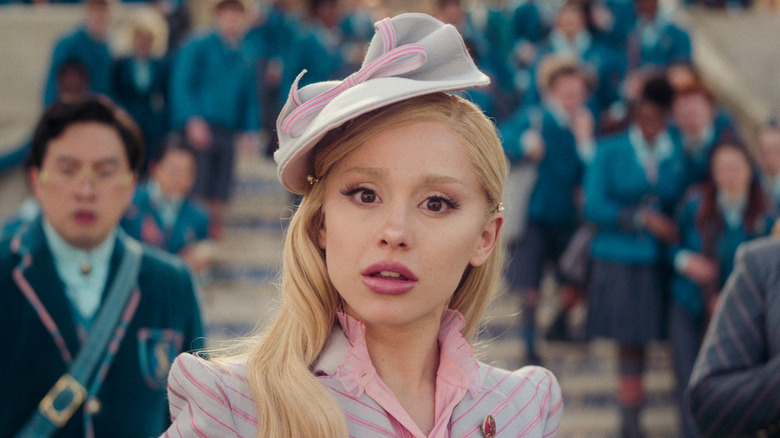Wicked Review: The Broadway Musical Becomes An Overlong And Messy Movie
Gregory Maguire's novel "Wicked: The Life and Times of the Wicked Witch of the West" was first published in 1995, a time when teenage Gen-Xers were having a ball deconstructing pop media and riffing on the inherent absurdities of previous generations' entertainment. This was an era when Richard Linklater's "Slacker" joked about the Smurfs, and when Kevin Smith's "Clerks" amusingly overthought the details of the Death Star. In 1995, there was a feeling that all media was coming to an end, and it was easy to make a sport of tearing old stories to the ground.
Maguire, as such, wrote a tale about how the Wicked Witch of the West from L. Frank Baum's 1900 novel "The Wonderful Wizard of Oz" — as well as from Victor Fleming's 1939 film adaptation — was actually a misunderstood sorceress who was forced into wickedness by a vapid schoolmate version of Glinda and a totalitarian version of the Wizard. The book was a hit, tapping into a vital note of '90s snarky dismissal.
Maguire's book would eventually serve as the inspiration for "Wicked," a 2003 Broadway musical that won three Tonys and expanded the careers of stars Idina Menzel and Kristin Chenoweth. The musical, unlike the book, was wholly earnest, featuring hummable ditties ("Popular"), as well as show-stopping barn-burners ("Defying Gravity"). Rather than serving as a deconstruction, the musical was an earnest attempt to make the Wicked Witch, named Elphaba, into a legitimately sympathetic figure.
And now, in 2024, we have Jon M. Chu's even more earnest film rendition of the musical version of "Wicked," presented as a 161-minute epic that only covers the first half of the Broadway show. Not only does Chu's "Wicked: Part I" (as it's called on screen, despite what the marketing would have you believe) lack the winking ironic verve of Maguire's novel, but it also lacks the bold, musical acumen of a Broadway show. Instead, it's a long, ineffectual, busy, mushy mess. And it's not even finished yet.
The two lead actresses don't bring a lot of personality to Wicked
In Chu's film, future Wicked Witch Elphaba is an illegitimate child born with green skin and "Carrie"-like telekinetic powers, powers which she uses when the local brats make fun of her color. Elphaba will eventually grow up to be a stalwart and not terribly interesting young woman played by Cynthia Erivo. Erivo is an excellent singer and can certainly belt out the show's bigger numbers with a Broadway baby's aplomb, but her performance otherwise is frustratingly subdued. It's as if she's afraid to show any actual wickedness, anger, joy, or any other emotion beyond intense frustration and mild concern.
The same might be said of Ariana Grande (credited in the film as Ariana Grande-Butera for reasons you can read here), who plays Galinda (the future Glinda). Elphaba meets Galinda at Shiz University, presented as a Hogwarts-like school for witches and warlocks (despite it just being the college for all of Oz) where Elphaba's little sister Nessarose (Marissa Bode) has been accepted. Galinda is presented as a vapid, shallow valley-girl-type character, more concerned with fashion and popularity than skill or achievement. Grande, a professional pop star, can likewise hit the high notes, but rarely brings any kind of lifelike expressions to her Beverly-Hills-inflected performance.
Elphaba unwittingly performs a feat of telekinesis in front of Shiz University's headmistress, Madame Morrible (Michelle Yeoh), and the young witch is accepted on the spot, not even having applied. Elphaba and Galinda become roommates, and one might expect the two actresses to downshift into cattiness mode as they discover their mutual loathing for one another. Song lyrics assure the audience that loathing is indeed developing, but I see nothing of that on the lead actresses' faces or in their performances.
The plot of Wicked underwhelms
It's only during the performance of "Popular" that Grande seems to open up and bring some actual energy to the part. Otherwise, both she and Erivo appear to be overwhelmed by the material, having to sing out from an over-designed set. The only actor who comes across as wholly at ease with the singing and dancing is Jonathan Bailey, who plays a Prince Charming-type student named Fiyero. He swans into the movie to sing a number called "Dancing Through Life," and for a few moments, "Wicked" feels like a proper show.
The plot of "Wicked" is largely half-baked. Elphaba finds that Shiz University is enacting a policy of bigotry wherein all of the intelligent talking animal professors are being ousted merely because they aren't human. The goat professor Dr. Dillamond (Peter Dinklage) is especially aware of the growing anti-animal policies. Oz, it seems, is a land of prejudice. That, however, is a subplot to a series of tired origin-story events that, in 2024, feel played out. Really? Another sympathetic villain? Another over-explanation as to how a famed pop figure received their clothes and accouterments? Can't villains just ... be evil? Did we learn nothing from Ron Howard's "Solo: A Star Wars Story"?
No, we must learn. We learn how the Witch got her hat. How she got her broomstick. How the flying monkeys came to be. There is even, during the film's climax, an on-screen decision to build the Yellow Brick Road. Elphaba dreams of one day meeting the Wizard of Oz (Jeff Goldblum). Late in the film, audiences will learn that the Wizard and Madame Morrible have their own plans for Elphaba.
At times, Wicked feels like Ron Howard's How the Grinch Stole Christmas
Chu, the director of excellent song-and-dance movies like "In the Heights" and "Step Up 3-D," should know how to better get expressive performances from his leads, or how to bring life and light to a fantastical Broadway show. Instead, the filmmaker almost seems bogged down by the film's overbearing production value. The Oz of "Wicked" is a generically overdesigned, vomitously colored mishmash of fantasy images, existing on a matrix with the "whimsical" worlds of Tim Burton's "Alice in Wonderland," Paul King's "Wonka," and, weirdly, Yorgos Lanthimos' "Poor Things." The film looks like a steampunk wonderland as reimagined through your grandmother's dining room, suffused with a Disneyland gift shop. The more ornate and musical "Wicked" became, the less interesting it was to look at. After 161 minutes, it becomes a wash of business. "Wicked" sorely lacks genuine whimsy.
"Wicked" most closely resembles, however, another notoriously ugly children's-book-adaptation about a famously evil, green villain: Ron Howard's "Dr. Seuss' How the Grinch Stole Christmas." That film also took thin material and stretched it into a prolonged cinematic experience that strains the audience's patience. In both "Grinch" and "Wicked" are visual testaments to the massive work that went into their own making — one can picture hard-working artists and designers hunched over their desks, designing eight versions of, say, a pair of clownish eyeglasses — and both are ultimately tiring, visual garbage disposals of color and candy.
Worst of all, the film is loooong. It's not just low-energy. It drags. One could listen to Pink Floyd's "Dark Side of the Moon" three and a half times in the same 161 minutes. And perhaps one should. It would be a more edifying musical experience.
/Film Rating: 4 out of 10
"Wicked" opens in theaters on November 22, 2024.



